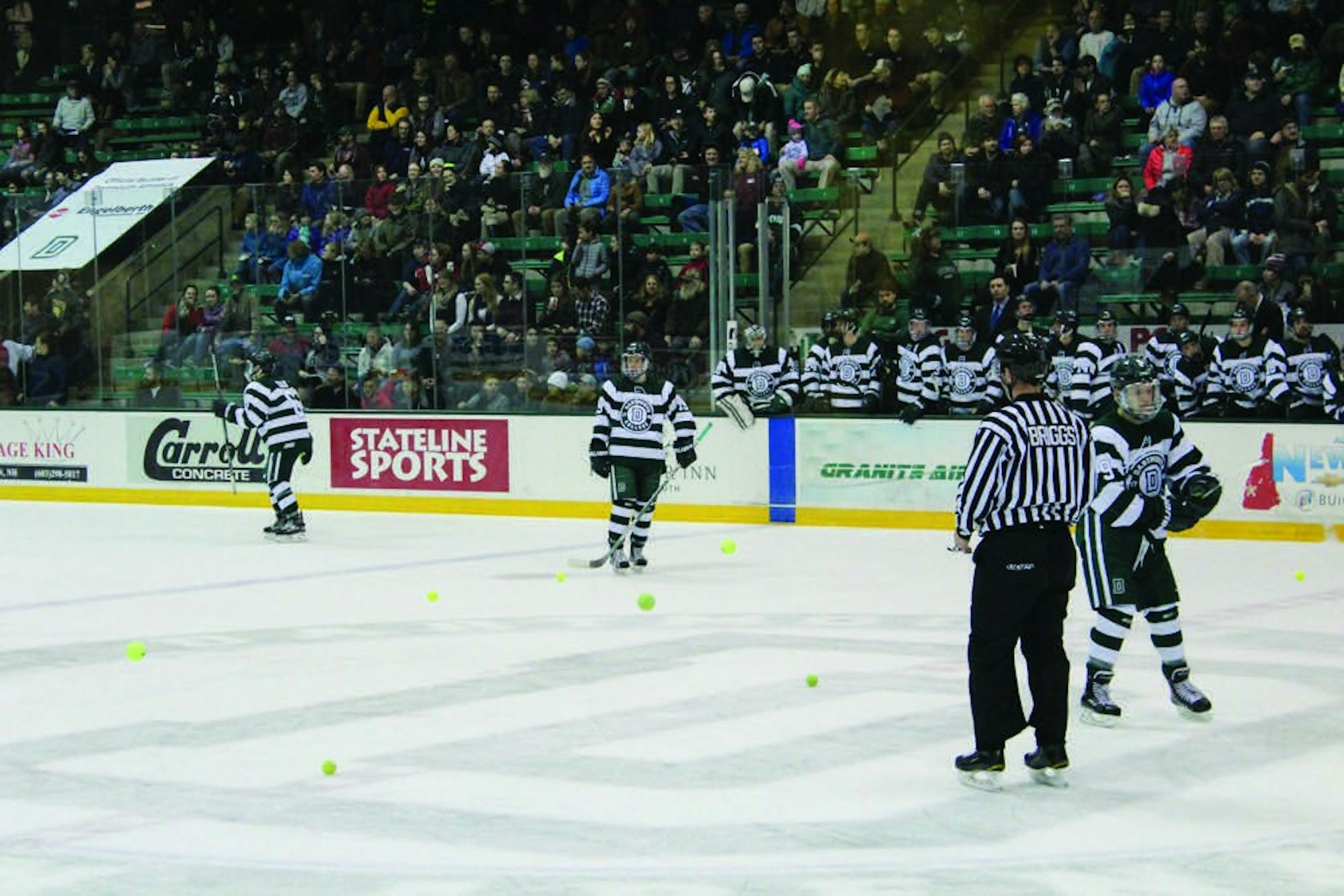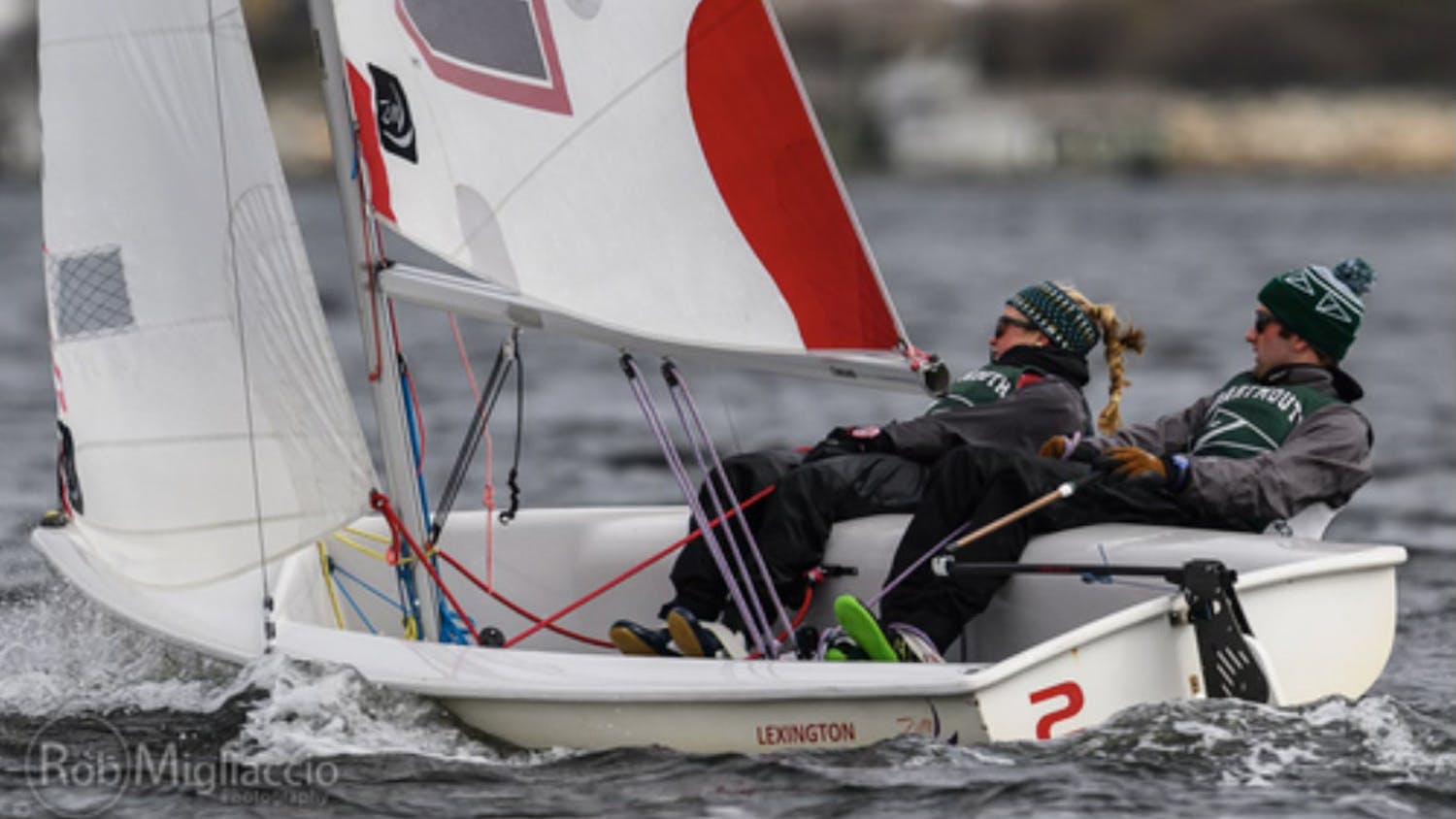Every year, the student body lines up outside of Thompson Arena with tennis balls in hand, waiting for the hockey game of the year against Princeton University. The tradition of throwing tennis balls onto the ice after the first Big Green goal has been kept alive for over two decades..
Head coach Bob Gaudet ’81, who is starting his 21st year with the program, said that this tradition began before he took his position at the College but after his time as an undergraduate and men’s hockey goalie.
Like many traditions, the tennis ball shower has poorly-defined roots. According to Gaudet, the origin actually lies with the Tigers. During one contest, a single Tiger fan threw a tennis ball at a Dartmouth goalie after Princeton scored its first goal of the game. Later, Dartmouth fans retaliated by bombarding the Tigers after Dartmouth’s first goal, solidifying the Big Green tradition.
Though fans and players enjoy the annual tennis ball throw, referees are not similarly enthusiastic.
Delay of game is a penalty in ice hockey, resulting in the offending player spending two minutes in the penalty box. Though unorthodox, the delay of game penalty can be imposed on fans as well. Historically, Dartmouth is not penalized the first time the rink is showered with tennis balls thanks to executive senior associate athletics director, Brian Austin, who talks to the referee before the game to inform them of the tradition. However, if the game is delayed after the second or third goal, the Big Green is often penalized.
Athletics director Harry Sheehy considers it a miracle that the Big Green has not given up a goal on tennis ball delay penalties during his first seven years at the College.
“But it’s gonna hurt us some day,” he said. “I just want to make sure we’re not hurting our own team.”
Sheehy said he was “stunned” when he first learned about the tradition.
“I don’t have anything against it — I think it’s kind of silly, but I was 19 once,” he added.
When he first started working for the athletics department, he was asked if he wanted fans to be checked for tennis balls upon entering Thompson Arena. Sheehy decided against it as long as this tradition is well monitored.
“We’re not hurting anyone, and it becomes a part of who we are and that’s okay,” Sheehy said.
He encourages students to get to the arena early to assure that they will be present when the first goal is scored to prevent students from throwing tennis balls on subsequent goals.
The athletes, Gaudet and Sheehy have all asked fans to restrain from throwing balls on goals scored after the first one, given that this tradition often leads to a delay of game penalty that could work against the Big Green.
Cam Strong ’20, who scored the goal that brought down the rain of tennis balls last season against Princeton, said the fan reaction gave his goal some extra meaning.
“I saw it more as just another goal, but it was definitely special being out on the ice and celebrating it with my teammates,” Strong said.
Princeton co-captain Eric Robinson finds the tradition entertaining too.
“[The tradition is] pretty cool especially since Princeton doesn’t have any similar traditions,” Robinson said. “It’s definitely something we look forward to each year, as the game is usually pretty packed and always has high energy.”
Official disapproval of the tradition has not deterred Big Green fans from participating throughout the years. In 1994, The New York Times covered the Dartmouth - Princeton game, reporting that fans threw not only tennis balls but also fruit. Officials stopped play, sent both teams to their locker rooms and forced the Big Green and the Tigers to play the six remaining minutes of the first period and 20 of the second without stoppage. That game ended with 20 penalties, 10 for each team, and a Princeton victory.
In 2004, fans were asked to refrain from throwing tennis balls on the ice, due to stricter rules under the Eastern College Athletic Conference, there would be no warning after the first offense. Gaudet and his players asked fans not to throw anything on the ice. Before the game, fliers were placed on each of the 4,500 seats in the arena. However, when the Big Green scored its first goal, tennis balls filled the air. Dartmouth received a two-minute delay-of-game penalty.
Later in the game, Hugh Jessiman ’06 scored a goal for the Big Green, tying the score at 2-2. The fans celebrated the second goal with more tennis balls, resulting in another Big Green penalty, one less player on the ice for two more minutes and eventually a 2-2 tie.
Even tennis-ball-crazed fans, however, can occasionally see reason. In 2015, Sheehy sent out a letter to the student body asking it to refrain from throwing tennis balls because it was an ECAC playoff game. He even threatened revoking students’ free admission to future ECAC playoff games if they did not comply. This time, it actually worked. He said his desire for giving the team an equal opportunity to compete for ECAC and national championships as the reason behind his letter. The Big Green swept the best-of-three series in two games, moving on to face Colgate University in the following round.
The last time the Big Green faced Princeton was on Dec. 1 at Princeton, when Dartmouth lost 9-2.
“Given our long rivalry with Princeton and how the last game went, we’re definitely all looking forward to this next game and have been very focused all week at practice,” Strong said.




